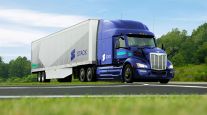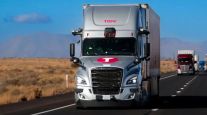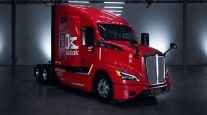Managing Editor, Features and Multimedia
Autonomous Trucks Could Create Safer Roads, Better Jobs

[Stay on top of transportation news: Get TTNews in your inbox.]
AUSTIN, Texas — Autonomous truck developers and their industry partners see opportunities for this technology to not only unlock greater efficiency in freight transportation, but also to improve road safety and create more desirable jobs for professional drivers.
“We believe this technology is now finally at a point where we can help make our roads safer and frankly keep more people alive,” said Ossa Fisher, president of Aurora, one of several companies actively developing autonomous driving technology for commercial trucks.
Autonomous trucks can help reduce crashes by better detecting potential safety risks such as pedestrians on the roadway at night and then responding to those hazards faster than human drivers, Fisher said during an Oct. 16 educational session at American Trucking Associations’ 2023 Management Conference & Exhibition.
To test that premise, Aurora studied 29 fatal crashes involving trucks that have occurred during the past five years on the Interstate 45 corridor between Dallas and Houston, where Aurora’s self-driving trucks might have been involved had they been on the road at that time. The company is currently hauling freight on that lane for industry partners with its test vehicles, which still have a safety driver behind the wheel as a backup.
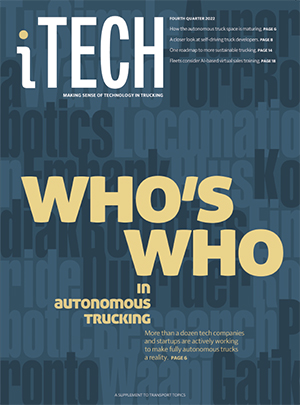
Who's Who in the Autonomous Space
►Overview of Self-Driving Truck Development
Company Sketches
Click the links to jump to profiles of autonomous companies.
Aurora | Waymo | TuSimple | Gatik | Locomation | Torc Robotics | Waabi | Einride | Plus | Embark | Kodiak Robotics | Robotic Research | Outrider | Pronto
Fisher said Aurora ran simulations to understand how its autonomous driving system, the Aurora Driver, would have responded in each of those situations.
“I’m proud to say in every single one of those 29 fatal collisions, the Aurora Driver would have avoided it,” Fisher said. “That means all those people would be alive and here today.”
Trucking companies such as Schneider that have been partnering with Aurora and other autonomous truck developers pointed to safety as the first and most important factor for commercial deployment.
“It has to be at least as safe as our safest driver. That’s the way we’re thinking about it across the industry,” said Jim Filter, executive vice president and group president of transportation and logistics at truckload carrier Schneider.
That is a high bar, he said, because the safest professional truck drivers accumulate millions of miles without accidents.
Beyond accident rates, Schneider also will consider underlying safety data such as the frequency of critical events involving hard braking or stability control, for example, and then examining how a virtual driver would have handled those incidents, Filter said.
Schneider, based in Green Bay, Wis., ranks No. 8 on the Transport Topics Top 100 list of the largest for-hire carriers in North America.
Safety also is the foremost consideration at J.B. Hunt Transport Services, said Craig Harper, the company’s chief sustainability officer and executive vice president.
The intermodal transportation provider will continue to work with truck manufacturers and autonomous vehicle companies and will watch the development of this technology, but will not deploy it until the company feels it is safe to do so, he said.
On that front, Harper highlighted autonomous truck developers’ progress toward addressing the many edge cases or very rare occurrences that a driverless truck might encounter.
“There is reason to believe that the autonomous players can indeed give us something that is safer than what we have out on the roadways today in many cases,” he said.
Beyond the safety case, fleets will need to understand variables such as the cost of deploying the technology and establishing transfer hubs for autonomous trucks, Harper said. Autonomous trucks also will only be suited to certain trucking applications and freight categories.
Even with the rollout of autonomous trucks, the industry will need to attract more drivers, not fewer, to keep up with anticipated growth in freight volumes in the next decade or so, he added.
“I do think this will be something we go into slowly,” Harper said. “I don’t see it being sudden mass adoption.”
J.B. Hunt, based in Lowell, Ark., ranks No. 3 on the TT100 list of for-hire carriers.
Olivia Hu, head of the autonomous trucking program at logistics provider Uber Freight, which also partners with Aurora, made the case that self-driving trucks can help improve drivers’ lifestyles by shifting more jobs from longhaul to local routes.
Drivers who have interacted with this technology through Uber Freight’s partnerships with autonomous truck developers have become “huge champions of self-driving,” Hu said.
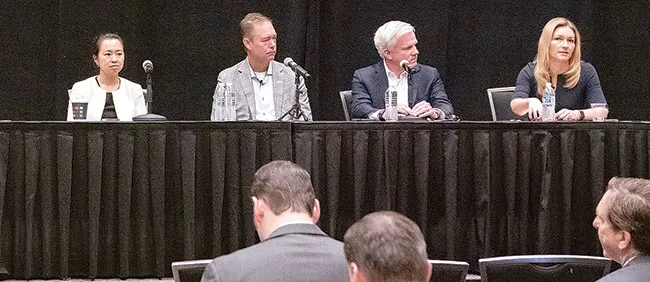
Olivia Hu (from left), Jim Filter, Craig Harper and Ossa Fisher. (John Sommers II for Transport Topics)
“They see how this changes their jobs,” she said. “They get to go home. They have consistency. They have predictability. They have a regular schedule that they can follow and they are all kept local. They no longer have to go across the country, sleep in their trucks and find parking spots.”
Chicago-based Uber Freight ranks No. 9 on TT’s Top 100 list of the largest logistics companies in North America.
The long-awaited commercial rollout of fully autonomous trucks on interstate highways may arrive in the near future.
Today Aurora still has a driver behind the wheel of its self-driving trucks, but soon the company will be ready to operate without a safety driver, Fisher said. “We’re very, very close. We’re closer than most people realize.”
The company intends to have the Aurora Driver ready at the end of this year, meaning that the technology will be safe enough from the company’s perspective to pull the driver, Fisher said.
Aurora plans to spend the coming year working with its partners, government regulators and truck manufacturers to pave the way for the company’s planned commercial launch at the end of 2024.
Fisher said that commercial launch will involve deploying about 20 autonomous trucks on the I-45 corridor between Dallas and Houston, followed shortly thereafter by an expansion to El Paso, Texas. From there, Aurora intends to continue growing its network either within Texas or to the West Coast or East Coast depending on customer demand, she said, with the goal of having tens of thousands of autonomous trucks operating across the southern United States by 2027.
Several other companies also are actively developing autonomous driving technology for commercial trucks, including Kodiak Robotics, Torc Robotics, TuSimple, Plus, Waabi, Stack AV, Robotic Research, Gatik and Einride.
.@Aurora_inno President Ossa Fisher discusses the development of autonomous vehicles and emphasizes opportunities for this technology to improve road safety and save lives at #ATAmce23. pic.twitter.com/7fAsxkhd0U — Seth Clevenger (@SethClevenger) October 16, 2023
Although autonomous cars and trucks are finally beginning to reach the commercial deployment stage, the notion of self-driving vehicles has existed for more than a century. Fisher showed an illustration of a driverless vehicle concept that appeared in a 1918 issue of Scientific American magazine.
That vision has been elusive for so long due to the technical challenges of automating the many complexities of operating a motor vehicle, but now the biggest problems have been solved, Fisher said. “The large technical barriers have really been pulled down at this point.”
As Aurora’s technology expands to new lanes the company will still need to address new details and nuances, such as a border control check on the route to El Paso, but Fisher said all the major technical hurdles have been cleared, including vehicle and pedestrian perception, recognizing emergency vehicles, operating in rain and other weather conditions and detecting a blown or underinflated tire.
“We are at a true inflection point in this industry and the way we operate on our roads,” she said. “The big technological barriers have been overcome, and it’s not just Aurora, its several players.”
Want more news? Listen to today's daily briefing below or go here for more info:



